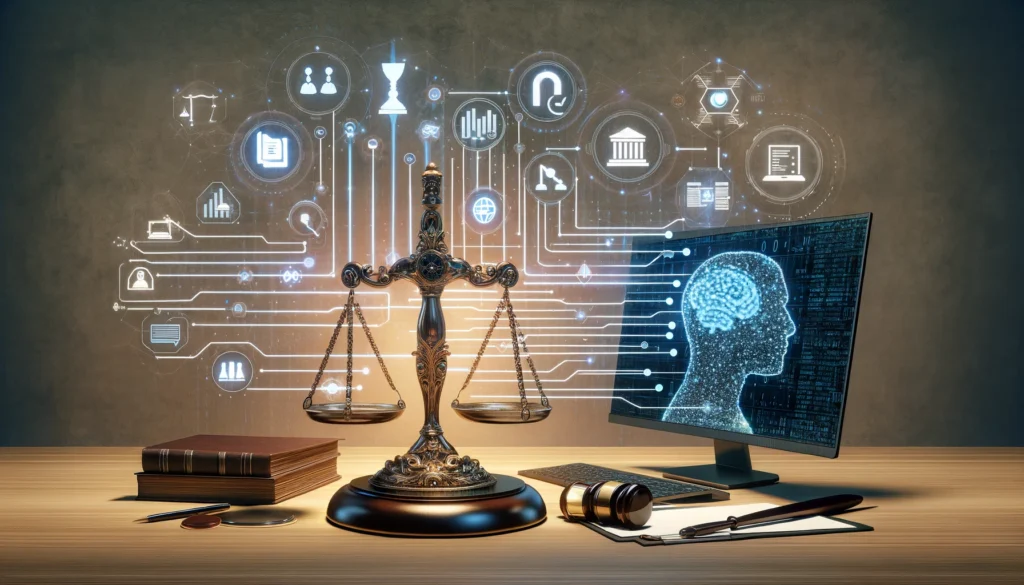
Harnessing AI for Legal Brilliance: Leveraging ChatGPT in Corporate Law Research
In a transformative era where artificial intelligence (AI) is increasingly becoming integral to various sectors, the field of corporate law is no exception. The expansion in the capabilities of AI has heralded a new paradigm in legal research, allowing for unprecedented efficiency and insight. Central to this shift is ChatGPT, a revolutionary language model that provides significant leverage in legal research. This article delves into the effective utilization of ChatGPT in corporate law.
Embracing the Future: Understanding AI in Legal Research
What is ChatGPT? An Overview of LLMs
ChatGPT, developed by OpenAI, is a state-of-the-art large language model (LLM) designed to generate human-like text based on given prompts. This tool capitalizes on deep learning techniques, enabling it to predict and generate text that is contextually relevant and semantically accurate.
The Evolution of Legal Tech: From LexisNexis to AI
The legal technology landscape has undergone a remarkable evolution. Traditional platforms like LexisNexis and Westlaw were groundbreaking in digitizing legal research. They provided searchable databases, making it easier for legal professionals to find precedents, statutes, and case law. However, AI-driven models such as ChatGPT push these boundaries further by not only assisting in information retrieval but also in understanding and contextualizing complex legal questions. This shift from static databases to interactive, intelligent systems signals a revolutionary change in how legal practitioners perform research.
With this foundational understanding of ChatGPT and its place within legal tech, we can now focus on how to prepare for its efficient use.
Setting the Stage: Preparing to Use ChatGPT Efficiently
Initial Setup and Accounts
Getting started with ChatGPT involves creating an account on the OpenAI platform. This process is relatively straightforward, requiring basic information and adherence to user agreement protocols. Upon successful registration, users can access the API or use the web-based interface to begin their exploration.
Data Privacy and Ethical Considerations
Legal professionals must exercise caution regarding data privacy and ethics. It is vital to understand that while using ChatGPT, confidential and sensitive information should never be fully disclosed. Implement necessary safeguards to ensure compliance with GDPR, CCPA, and other relevant data protection frameworks. Additionally, ethical considerations should guide the usage of AI, with a focus on transparency, accountability, and maintaining the integrity of the legal profession.
Setting up and ensuring ethical compliance lays the groundwork for the effective use of ChatGPT. The next step is to master the art of crafting effective prompts.
Mastering the Art: Crafting Incredibly Effective Prompts
Understanding Prompt Engineering
Prompt engineering is the practice of crafting inputs or questions directed at an AI model to yield the most relevant and accurate outputs. Effective prompt engineering requires clarity, specificity, and contextual relevance. The goal is to guide the AI to provide information that is not just relevant but also precise and comprehensive.
Sample Prompts for Common Legal Research Tasks
- Research on Specific Case Law:
“Provide a summary of the landmark case Brown v. Board of Education and explain its impact on racial segregation laws.”
- Statutory Interpretation:
“Interpret the implications of Section 230 of the Communications Decency Act on modern internet companies.”
- Legal Precedents:
“Identify and summarize three precedents set by the Supreme Court that influence corporate liability.”
- Comparative Legal Analysis:
“Compare the corporate tax policies of the United States and the United Kingdom, highlighting key differences and implications.”
Arming oneself with the techniques of prompt engineering empowers legal professionals to harness the full potential of ChatGPT in their research endeavors. With skilled prompt crafting, we can now explore how to engage in dynamic, interactive legal research using ChatGPT.
Dynamic Dialogue: Interactive Legal Research with ChatGPT
Leveraging Conversations to Refine Searches
One of ChatGPT’s most compelling features is its ability to engage in interactive dialogue. Legal researchers can iteratively refine their searches through back-and-forth interaction, asking follow-up questions to clarify or delve deeper into topics. This dynamic engagement ensures that initial broad queries can be narrowed down to pinpoint precise information tailored to specific legal scenarios.
Extracting and Organizing Information Efficiently
Efficiency in research is amplified through the strategic use of ChatGPT’s output. Extracting relevant excerpts, summarizing lengthy documents, and categorizing information based on contextual relevance can optimize workflows. Legal practitioners can then organize this information systematically using digital tools like spreadsheets or databases, ensuring easy retrieval and analysis.
With a firm grasp on dynamic dialogue and information organization, the next step involves exploring advanced techniques for expert power users.
Beyond the Basics: Advanced Techniques for Paralegal Power Users
Utilizing Contextual Memory for Complex Tasks
ChatGPT’s ability to retain context across interactions is crucial for handling complex legal research tasks. Paralegals can leverage this feature by building upon previous conversations, creating a cumulative knowledge base that can address multifaceted legal questions or intricate case analyses.
Integrating Multiple Sources for Comprehensive Analysis
Advanced users can enhance their research by integrating multiple sources. This involves cross-referencing ChatGPT’s outputs with trusted legal databases, academic journals, and statutory archives. By triangulating information, paralegals ensure comprehensive and authoritative legal opinions. Furthermore, legal research software that supports API integration can automate this process, streamlining cross-referencing and synthesis of data from disparate sources.
Armed with advanced techniques, legal professionals are well-positioned to incorporate ChatGPT into their daily tasks seamlessly.
The Workflow Wonders: Incorporating ChatGPT into Daily Paralegal Tasks
Time-Saving Strategies and Tips
Implementing ChatGPT into daily workflows can significantly reduce research time. Regular use of saved prompts, automation of routine inquiries, and employing batch processing for related queries can conserve valuable time. By delegating preliminary research to AI, paralegals gain more bandwidth to focus on higher-order analysis and strategic planning.
Collaboration and Reporting Automation
ChatGPT can also be leveraged for collaboration and reporting. Real-time co-working on legal documents, generating preliminary reports, and drafting legal memos can be expedited. Automating report generation ensures consistency and accuracy, freeing paralegals to engage in critical review and quality assurance.
With streamlined workflows and robust collaboration, we turn our gaze to the future trends and continuous learning in the field of AI in legal research.
The Road Ahead: Future Trends and Continuous Learning
Looking ahead, AI’s role in legal research will only expand. Continuous learning is essential; staying abreast of advancements in AI technology and legal AI applications ensures that legal practitioners remain at the cutting edge. Upcoming trends suggest deeper integration with legal databases, enhanced predictive analytics, and more sophisticated natural language processing capabilities.
The horizons of AI in corporate legal research are vast and promising. Embracing tools like ChatGPT not only enhances efficiency but also propels the legal profession into a future of unprecedented analytical capabilities and innovation.


